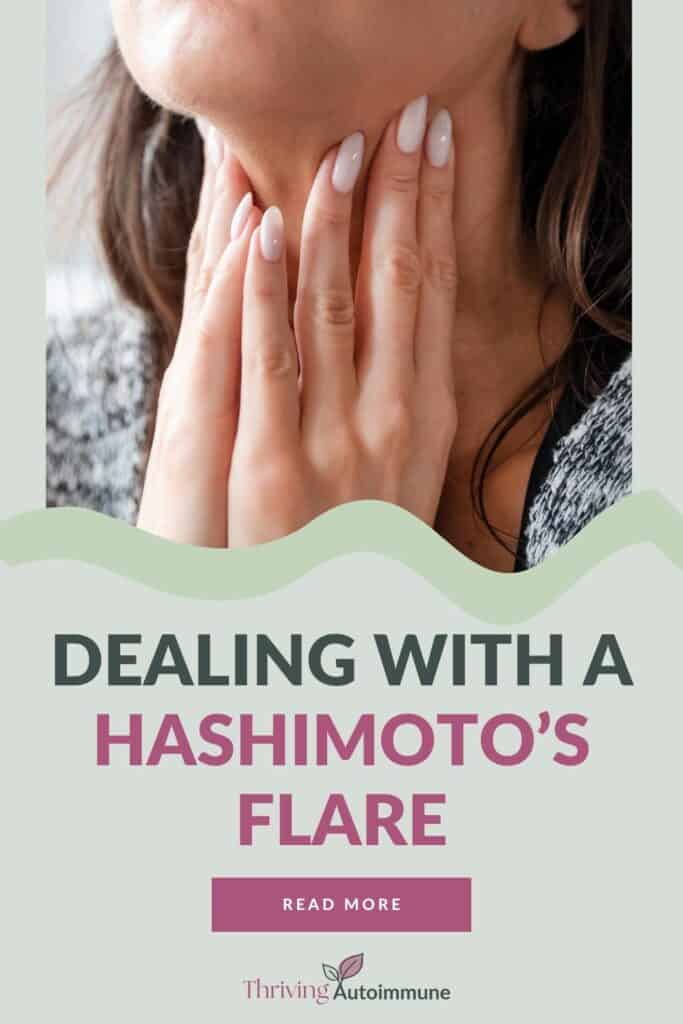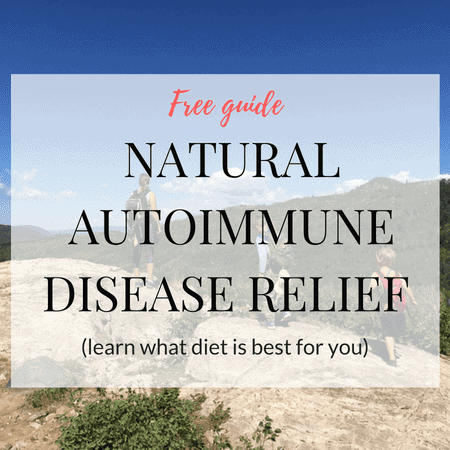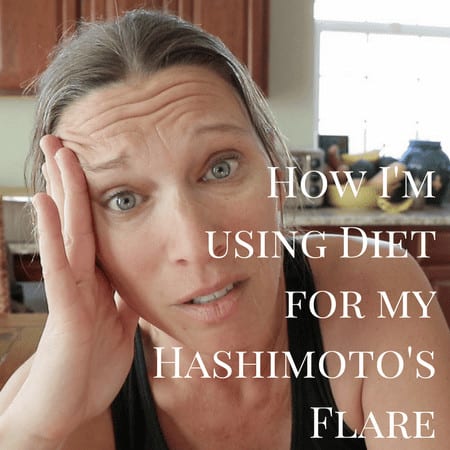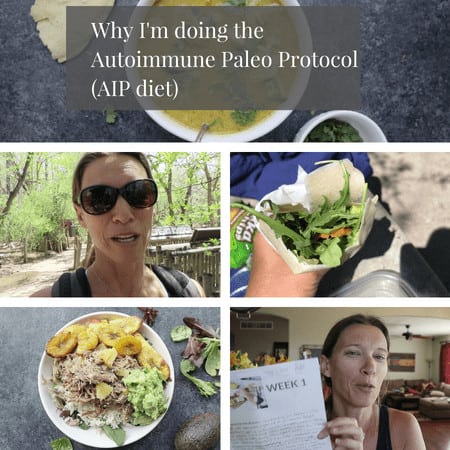This post may contain affiliate links. Please read my disclosure policy.
A Hashimoto's flare can be downright scary and frustrating. Here are some simple ways to deal with one
If you have Hashimoto's, you know the seemingly random symptoms that creep up on you out of nowhere – the heart palpitations, the extreme exhaustion and fatigue, the cold hands and feet, inflammation in the body (that can lead to aches and pains that just won't go away), brain fog and/or memory issues, anxiety, massive blood sugar swings, sore throat, and on and on.
Not sure if you're in a Hashimoto's flare? See the Hashimoto's Flare Up Symptoms.
Even if you've been successfully managing the symptoms and have put your Hashi's in remission via diet and lifestyle changes, you can sometimes get these flare ups that happen where you experience the symptoms for a period of time.
They're really frustrating because if you've gone from feeling great to having all the symptoms come crashing back down on you, they just plain suck.
I've been through many Hashi's flares, and they definitely aren't fun.
Sure, it's not as bad as some other autoimmune disease flares and for that I am very thankful. However, when I have to sit around not participating in the activities my family is doing because I'm exhausted, my heart palpitations make me feel dizzy, and I can barely think because of brain fog, I get super frustrated.

Managing Hashimoto's
For many people, including myself, managing Hashimoto's Thyroiditis is a mixture of diet, lifestyle, and thyroid medication. You must eat healthy – and foods that work for YOU, and you must build in relaxation and movement throughout your days. And for some, it's also making sure your dose of thyroid medication is correct.
It's like a recipe. Forget one of those things and you are on a slippery slope but you can most likely recover quickly.
But continue to forget it or ignore a few of them and you wind up with a flare.
Sometimes flares end quickly, like you get a little nudge saying “c'mon now, get back on track.”
Other times they can last for several days to weeks.
If you don't take action THEN? You're looking at having issues for a long time.
Possibly facing a far more difficult road to recovery or further complications because, after all, your body is at that point of attacking your thyroid tissue again. No one needs that to happen and it surely doesn't lead to good things.
What to do if you are experiencing a Hashimoto's Flare
The best thing to do when you experience a flare is to take an immediate step back and look at what you are doing diet- and lifestyle-wise.
Questions to Ask Yourself
I find it best to ask yourself these questions – and give an honest answer:
Have I:
• been eating the foods that are best for my body? If you have known food intolerances or sensitivities (perhaps discovered from doing an elimination diet), have you been eating those foods? Or are you only eating the foods that you know work for you? (keep reading if you don't know what these might be)
• eating a good variety of these foods – getting a variety of nutrients in? Sometimes we get a little caught up in “what do I need to take OUT of my diet” but it's important to make sure you're adding nutrient-dense foods that help support the immense vitamin and mineral needs of your immune system
• giving myself adequate relaxation and “me” time? Stress and not enough rest/recovery can be a huge triggers for autoimmune flares.
• experienced more stress than usual? Has something happened? Again, stress is a huge trigger, and acute stress can quickly make a flare happen. Things like a death or illness of someone close to you, a car accident, a law suit, divorce, birth of a child, child going away to college, house move, etc – these all are common triggers.
• been getting enough movement in? When you don't get any exercise, your immune system becomes compromised and you have decreased resistance to stress and other flare triggers. Walking, hiking, biking, yoga, pilates, barre, jogging, swimming, etc are all great exercises for those with autoimmune disease.
• been getting too MUCH movement in? (doing cross fit or P90X 5-7 days a week, or training for a marathon or Ironman without adequate recovery could be the cause, for example) TOO much movement can cause your body to go into flight-or-fight mode, produce too much cortisol, and create leaky gut – all things that are triggers for flares (source Paleo Mom)
Once you have answered these questions, you can start making some changes to your life to correct these and hopefully reverse the flare quickly.
My Own Hashimoto's Flare Triggers
I've found after years of this that my triggers typically are one of the following:
• eating wheat/gluten – I'd only eat it accidentally because I also have Celiac Disease so I'm very strict on not eating any
• eating corn – I've learned from a lot of experimentation that eating corn a few times (like 2-3 times in a week) will cause a flare. Half the time eating corn once though gives me terrible sciatic back pain.
• eating dairy – usually dairy just gives me almost immediate gas and bloating, but if I have it a few times I'll get other flare symptoms as well
• not getting enough sleep – typically a few nights over the course of a week will cause a flare. One or two nights usually doesn't do anything, but if I have a lot of insomnia for some reason or I get to bed a lot later than usual few nights, symptoms creep up on me. I typically get between 8-9 hours of sleep a night, from 9:30 pm-6:15 am.
• getting too much or too intense exercise – I believe that my own initial trigger of my Hashimoto's was from doing several Ironman triathlons without adequate recovery time (I did 2-a-day workouts most days). Now I can't even run 3 miles without getting flare symptoms. So I keep my own exercise to walking 30-45 min a day, doing Barre once a week, yoga and pilates every so often, and sometimes doing day-long mountain hikes. Sometimes I can get away with more, but I don't push myself if I'm feeling tired or “off” anymore.
• eating too much sugar over a period of time – this is usually a few weeks of gradual sugar increase to where I may be having a dessert every day and maybe a baked good earlier – and this includes honey and maple syrup.
• a lot of stress – this is one of my biggest triggers behind eating corn or dairy. I've had to become hyper-vigilant about doing meditation every day, saying no to too many things, making sure I take some time to read or craft, and doing breathing exercises throughout the day.
Once I figure out what might be causing my flare, things start usually improving immediately.
I find personally that sticking mainly to a Paleo diet is where I feel my best. I also have white rice, chickpeas (1-2 x a month), oatmeal on occasion, and I'll sometimes eat some gluten-free baked goods. But I try not to go too far from Paleo because I start to feel poorly pretty quickly. (This is my Hashimoto's Diet)

If you have NOT yet gotten your Hashimoto's Symptoms under control
If the only thing you may have done so far to manage a Hashimoto's flare (or hyperthyroidism or hypothyroidism) is take the thyroid medications your doctor gave you, read on.
If you've come to this post because you're experiencing a flare after (or during) Paleo or AIP, skip down to the next section.
What does it mean to have Hashimoto's under control?
If you're wondering by what I mean by getting your Hashimoto's under control, it means making sure the autoimmune disease activity is not going crazy in your body.
When you have an autoimmune disease like Hashimoto's (and in the US, most cases of Hypothyroidism and Hyperthyroidism are rooted in an autoimmune disorder like Hashimoto's or Grave's Disease), your body produces antibodies against your own tissue. In this case, it's your thyroid that your body is attacking.
To see more about what Autoimmune Disease is and what's going on in your body, check out my Autoimmune Disease 101 series.
Many times doctors will prescribe a thyroid hormone like Levothyroxine, Synthroid, Nature-throid, Armour, Cytomel, etc to help replace the thyroid hormone that your body isn't producing any longer.
This is the current standard of care and usually where any doctor-patient relationship for this disease stops.
BUT – one of the MOST important things to note is….
Thyroid Medication is NOT ENOUGH
JUST going on medicine like Synthroid or levothyroxine isn't the answer!!!
Please do not let a doctor tell you that it is!!
That just helps one teeny tiny piece of the Hashimoto's puzzle.
The medications just help replace the thyroid hormone you no longer can make. But they don't stop the disease activity from happening in the background.
I was on levothyroxine for 8 years with a diagnosis of “hypothyroidism” where I still had symptoms and things just kept getting worse. It wasn't until I learned that I had Hashimoto's (basically that my disease was autoimmune in nature), and learned that the autoimmune disease was still attacking my thyroid – despite medication – that it all clicked.
Let me repeat that.
The medications do not stop your body from attacking your thyroid. If you don't take measures to stop it, you'll potentially get worse over time, lose more thyroid tissue, need a higher dose of medication, and have a much harder time of recovery.
Disease activity = symptoms (and maybe more autoimmune diseases down the line).
*NOTE: It's important to continue taking your medications though – every cell in your body has thyroid hormone receptors and you still need the hormones that the medications provide.
How to Control Your Hashimoto's
*I am not a doctor or medical practitioner – just a Hashimoto's sufferer. This article is meant as encouragement and is not meant to replace any advice from a medical practitioner. Please check with your own doctor if you have any medical-related questions regarding your autoimmune disease.
What do you need to do to control your Hashimoto's?
Diet and lifestyle changes are some of the most effective things you can do on your own, and sometimes you need to work with a medical practitioner to uncover some root causes.
[arve url=”https://youtu.be/RZFJrDBLLqo” title=”Hashimoto's Disease – How to Get Your Life Back & STOP Feeling Symptoms” description=”Hashimoto's Disease (Hashimoto's Thyroiditis) can really disrupt your quality of life. Unfortunately, most doctors JUST prescribe meds and don't tell you your disease CONTINUES to rage on – here's how to control it ” upload_date=”2019-11-12″ thumbnail=”7507″ /]
Diet
If you remove inflammatory foods, give your immune system a chance to calm down and stop attacking itself, and heal leaky gut (which is present in most cases of autoimmune disease), oftentimes you'll notice a huge reduction in symptoms and corresponding thyroid antibody tests.
You may also possibly uncover some food intolerances that you may not know you have.
**You might be saying “I don't have any food intolerances” and trust me when I say that I thought that for 37 years of my life as well. Then I discovered that I in fact DID, and that many of the things in my life that I had accepted as normal were not normal (like diarrhea, gas, bloating, brain fog, etc)
It's really important to note that changing your diet is only one piece of getting your Hashi's under control and that there could be other factors like gut infections, toxins, nutrient deficiencies, and lifestyle factors that could be triggering it as well.
To learn more about what diets I recommend, see Autoimmune Disease Diet Options.
Hashimoto's and Gluten
There is a strong connection between Hashimoto's and gluten-sensitivity, so if you have any sort of autoimmune thyroid disease, avoiding gluten for at least 3 months if you haven't already may be the very first step you take to getting your Hashi's under control.
It can take up to 3 months for gluten and any autoantibodies created in response to gluten to leave the body, so that's why 3 months is optimal, but at the very least try 1 month.
This means ZERO gluten too – not having a beer on the weekend and a bite of your friend's chocolate cake at lunch. None. Nada. Zilch.
In a study by Izabella Wentz of 2532 people with Hashimoto's, a whopping 88% said they felt better following a gluten-free diet.
And if you're already on a gluten-free diet, doing something like a Paleo or Autoimmune Paleo (AIP Diet) can also really help as well as it may help even more with the inflammation and uncovering food intolerances.
In fact, there was even a study recently done on the AIP Diet and Hashimoto's that showed it really does help! (And that's the diet I originally used to get my own Hashimoto's under control)
See more about the AIP Diet in the ULTIMATE Guide to the AIP Diet – everything you need to know to be successful!
Lifestyle
Stress alone can cause autoimmune flares or trigger it to start in the first place, so it's REALLY important to get that under control. It's often accepted as “normal” these days, but it shouldn't be!
Your body also needs a lot of rest and recovery – adequate sleep is a must (at least 8-9 hours if possible) and also trying not to overdo it. If you feel wiped out after doing a shopping trip, take some time to rest, don't try to do a monster batch cooking session right after!
Also get the optimal amount of exercise for you since as mentioned above, too little and too much can cause your immune system not to work correctly.
This may take some experimentation to see what does and doesn't cause symptoms or any weird reactions (for instance, I often get a cold or virus after running).
Your Mental State
One other thing that I think is VERY important and not often mentioned elsewhere is stopping the resentment towards your disease and symptoms. If you're constantly thinking about how you're “sick” and “poor me”, you're constantly telling your brain and body that you're sick.
What do you think your brain and body does with that?
It makes sure you're sick!
Your brain has FAR more power over what happens to you than you probably realize, so let me tell you that what you think over and over again often comes true.
Instead, every time you catch yourself saying or thinking, “I'm sick” or “I don't feel well”, think “I'm on my way to feeling great” or “I feel so much better today than I did yesterday!” or “Every day I become healthier”.
The body will soon follow!
Working With A Practitioner
I am a participant in the Amazon Services LLC Associates Program, an affiliate advertising program designed to provide a means for us to earn fees by linking to Amazon.com and affiliated sites.
I also highly recommend working with a functional medicine practitioner or open-minded doctor or naturopath if it's possible and within your budget to find out the root cause of your issues and to get on a recovery plan that works for your own personal situation.
Sometimes the root cause of Hashimoto's can be infections, viruses, nutrient deficiencies, toxins, or parasites, and most of these can't be fixed, or at least fully healed, with diet alone.
If it's is totally out of the question for you to work with someone, I highly recommend reading Izabella Wentz's book, Hashimoto's Root Cause.
Get more Info On What To Do
To learn more about your disease and see what diet and lifestyle changes may help you – Start Here to see what I recommend.
That page has far more information than I can share in this post, but it will really help you. It goes over what autoimmune disease is, what causes it, how diet and lifestyle can make it worse, and how to use diet and lifestyle to make it better.
If You'd ALREADY Gotten Your Hashi's Under Control
If you went through the questions above and hadn't changed anything…
I recommend that if you've previously managed your Hashimoto's successfully through means other than just medication and are experiencing a flare but you haven't changed a thing, that you check in with your doctor.
Letting flares go on for too long is a bad idea – something is obviously going on in your body to cause it, so finding that cause and fixing it as soon as possible is the best possible course of action.
Sometimes people like to ratchet down their diet a bit, so like if you've been on AIP and are halfway through reintroductions and are having a flare, going back to the elimination part for a bit. This is fine – for a bit – but no amount of ratcheting down is going to help if there is another root cause happening.
If after a several weeks you're still flaring, work with someone to figure out what's going on. Don't “AIP harder” or just use diet as your tool at this point.
Some of the possible things that might be a root cause that you should work with a practitioner on:
- a change your medication dosage
- some mineral/nutrient imbalances that only supplements or some other solution can change
- exposure to some toxins
- histamine intolerance
- hormonal imbalances
- you might have picked up an infection or parasite – or one is coming back that wasn't completely eradicated, like SIBO or H. Pylori
These are all things that are common and should be fixed easily – with help.
Of course though, if you just totally go off of the diet that works for you (like how I just stopped doing Paleo for a few months back in 2017), going back to AIP for a few months to get everything back under control is just fine.
What to do if you are scared
The most important thing I can leave you with is that if you're going through a flare, know that it IS a flare and it's temporary.
You aren't dying, the world is not ending, and you WILL get through it.
They can be downright scary, especially when you wake up and have 3 more symptoms on top of everything else.
It's quite easy to go down that path of thinking that everything is going wrong and to freak out completely.
But don't do that – you'll just make things worse.
Calmly assess your situation, answer the questions above, figure out if you can make some positive changes that will get you out of your flare, and then if that doesn't work, talk to your doctor.
And know that you did NOT do anything wrong or bad to deserve this.
Connect With Others Going Through It
You can also talk to others who may either be going through or have gone through the same thing.
You can search for local Meetups to find people locally, or I have a free private Facebook group with people from all over the world, most with varying stages of autoimmune disease, all trying to figure out how to make it work. Not everyone eats Paleo (or some form of it), so if you're curious, come join us! Join here.
Write Down Symptoms
It's also helpful to write down all the symptoms you experience. At first, the list will probably get longer and longer, but try to just look at them as if it's happening to someone else. I kind of just laugh as I pile on yet another symptom – “oh, my teeth hurt today, so random”.
As these symptoms start to go away though it feels AWESOME to cross them OFF the list.
Soon you'll find yourself feeling normal again. Try to stick with the new habits that got you out of the flare and not go right back into the old bad habits. I know, easier said than done – preaching to the choir here 🙂
I offer a 30-day journal to record your symptoms and food that makes this process easy. Get the print copy here and the PDF copy here.
Helpful Hashimoto's Resources
Here are a few things that may help you with your flare:
LEARN WHY AUTOIMMUNE DISEASE HAPPENS
In my free (no email needed) Autoimmune Disease 101 series, learn what autoimmune disease is, what causes it, how what you eat and how you live affect it, and the diets I recommend to help with symptoms. Watch/Read Part 1 here.
SEE HOW I GOT BETTER FROM A HASHIMOTO'S FLARE
I went through one of my biggest Hashi's flares in 2018 after a few months eating just gluten-free (not Paleo), so I shared how I first used a Whole30 to try to stop it and then AIP (Autoimmune Paleo) to completely get over it. You can see the Whole30 Series starting here and the AIP one starting here.
This is the video that started it all though 🙂
[arve url=”https://youtu.be/WnlucXA4YFU” title=”Another Hashimoto's FLARE | Doing a Whole30 in March” description=”A Hashimoto's flare can be downright scary and frustrating. Sometimes called hypothyroidism or hyperthyroidism, this autoimmune thyroid disease causes many” upload_date=”2018-02-21″ thumbnail=”4649″ /]
Subscribe to my YouTube Channel to make sure you get to see all my videos (what I eat, how I'm doing with my Hashi's flare, what I do to keep it under control, living with an autoimmune disease, and more).
More posts you might like….




Hi Michele, I have been doing AIP on and off for two years and can’t seem to find relief… I’ve read your blog and all the books out there and I’m stuck. I’ve figured out eggs, dairy, alcohol and recently gelatin and meat are causing my biggest flares but I don’t see anyone mentioning they have flare ups from meat. Is this possible? Will it go away? How can I do AIP without meat? That seems almost impossible and unhealthy to me. Any ideas?
I’ve heard of some people having issues with meat – but whether it’s because of the meat itself or some downstream effect is the question. Like for example, many people suffer from low stomach acid, and having to digest proteins like meat cause gas, bloating, heartburn, etc, plus flares from being unable to extract the nutrients. And sometimes it’s a lack of an enzyme that allows this process to happen (but yet stomach acid is ok). And sometimes there could be an actual sensitivity to meat as well. Have you worked on stomach acid and/or enzymes at all? And have you noticed this with ALL meat or just certain types? Like fattier cuts (beef, chicken thighs) vs leaner cuts (chicken breasts), etc?
I was reading through the symptoms of a flare up and can definitely relate to some of them currently (irritability, apathy, fatigue), and its good to know I’m not going crazy suddenly feeling this way. I am currently 3 weeks into the elimination phase of the AIP diet, so I wanted to see what recommendations anyone had for dealing with these mood related symptoms outside of a diet. I’ve done the AIP before (two years ago) and it did not have these symptoms with that drastic change in diet. The diet is super helpful and helped me regulate the first time around, but this time its been difficult. I guess I should get my levels checked first? Thanks